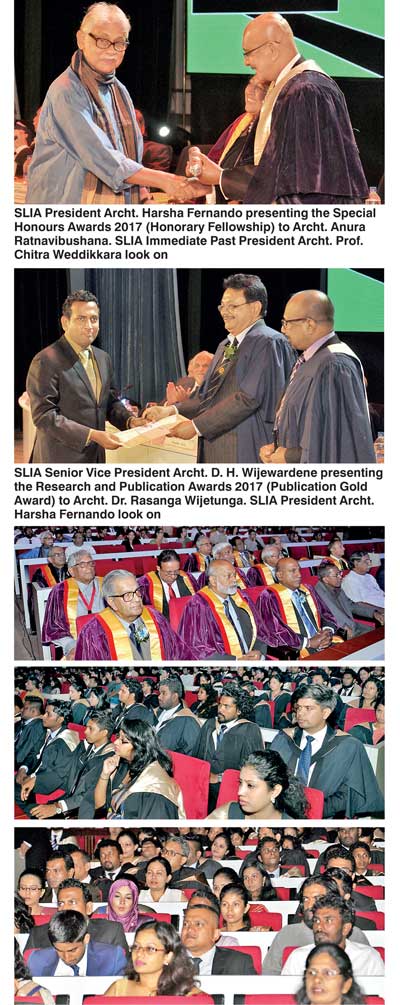Wednesday Mar 04, 2026
Wednesday Mar 04, 2026
Wednesday, 15 February 2017 09:49 - - {{hitsCtrl.values.hits}}
From left: SLIA Hony. Treasurer Archt. Veranjan Kurukulasuriya, Archt. Moshe Safdie (Special Guest), ARCASIA President Archt. Jahangir Khan (Special Guest), SLIA Vice President Archt. Bernard Gomez, Guest of Honour City Planning and Water Supply Minister Rauff Hakeem, SLIA President Archt. Harsha Fernando, Chief Guest Special Assignments Minister Dr. Sarath Amunugama, SLIA Immediate Past President Archt. Prof. Chitra Weddikkara, Public Enterprise Development Deputy Minister Eran Wickramaratne (Special Guest), SLIA Senior Vice President Archt. D. H. Wijewardene, Arch. Gibson Rhie (Special Guest) and SLIA Hony. Secretary Archt. Russell Dandeniya
By Uditha Jayasinghe
Colombo’s peaceful environment makes it ideal to be reclaimed and developed as an iconic city, said Special Projects Minister Dr. Sarath Amunugama yesterday, calling on architecture professionals to ready themselves for the next leg of urban development planned by the Government. 
Addressing the inauguration of the Sri Lanka Institute of Architects (SLIA) Annual Sessions 2017 under the theme ‘Return of the City: Mega structure Redefined’, Dr. Amunugama touched upon the readiness of Colombo and other key cities to be upgraded to better living spaces in line with Government plans.
“I thank the architect field for the great service they have rendered to Sri Lanka. Colombo is now one of the safest cities in the world and architects have much to do in the next few years. The Port City project will create large spaces for the public along with parks and the Megapolis project will concentrate on improving the living standards of millions living in Colombo and the Western Province,” he said.
Dr. Amunugama also dwelt on the Kandy and Trincomalee Master Plans, currently being worked out by Singaporean housing company Surbana Jurong. The Government will implement these projects targeting sustainable development in urban spaces and allowing low income communities to be absorbed into these spaces, he said, calling on architects to support these ventures though collaboration and joint ventures.
The Cabinet has passed the draft legislation for setting up the Megapolis Authority, Urban Planning and Water Supply Minister Rauff Hakeem said while speaking during his turn at the SLIA Annual Sessions inauguration.
Hakeem was upbeat about the formation of the new authority which will oversee as many as 160 individual projects that have been identified by various Government agencies. The Megapolis project, which is the main development drive of the Government, is targeted to attract north of $ 40 billion in investment over the next few decades.
However, such a massive project would require higher standards and greater human resources, he noted, adding that working to improve basic infrastructure including transport and basic spaces would be a challenge.
“In Sri Lanka urbanisation is happening slower than in other countries. But it is happening. In addition to the need to improve living standards it has been found that cities, especially Colombo, contribute as much as 80% of the country’s GDP. Therefore it is all the more important because it has a direct impact on our economy,” he told the gathering.
Hakeem, echoing the statements made by Dr. Amunugama, said Prime Minister Ranil Wickremesinghe had instructed five Cabinet Ministers from Kandy to form a taskforce to deal with significant urbanisation issues in the hill capital. Traffic congestion, garbage collection and many other issues are worse in Kandy than in other parts of the country, acknowledged Hakeem. Restoring and renovating Bogambara prison will be the first project undertaken by the taskforce in Kandy.
World-renowned architect Moshe Safdie, giving a short introduction of his address, which will be elaborated on during the sessions today, emphasised the importance of architects working to enhance and bring back public spaces that are increasingly being dominated by private companies.
“The single most important thing that an architect must do is improve the lives of people. This is their primary task,” he said. Having worked extensively around the world, Safdie praised efforts by the Singaporean Government to reclaim public spaces and make them accessible to people, which he insisted had to come from Government policy because private companies would otherwise enclose that space.
“Relying on the market in this case has a negative impact because it means that every space is evaluated based on its commercial value. In a sense it is wrong to say that we should “return” to the city because we never left the city. What we should try to do is fix our cities,” he added.
Rampant urbanisation around the world is driving down living standards, Safdie said, pointing out that for the first time in history more people are living in cities than in villages. This demographic shift will bring new challenges that are already evident in many parts of the world including Colombo, he noted.
Pix by Ruwan Walpola